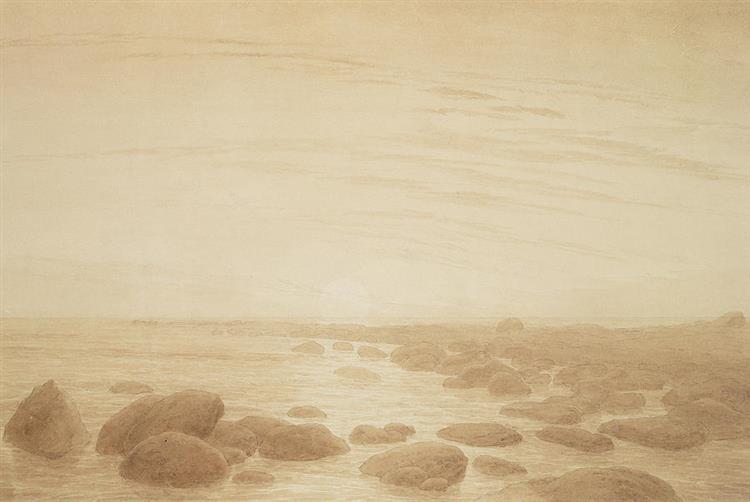Description
"Moonrise on the Sea", painted by Caspar David Friedrich in 1822, is a masterpiece that exemplifies the essence of European Romanticism. Friedrich, a prominent German painter, is known for his ability to capture the majesty of nature and the complexity of human emotions. This painting, like many of his works, invites the viewer to contemplate not only the beauty of the landscape, but also the relationship between man and the sublime.
In Moonrise at Sea, the composition is carefully balanced, leading the viewer's gaze across a meticulously detailed sea horizon, where the sea reflects the soft, silvery light of the moon rising in the sky. The atmosphere created is both magical and melancholic, a reflection of the duality of nature that Friedrich often explored. The moon, depicted as a glowing object, radiates a cyclopean light, becoming the focal point of the work. Its influence on the landscape is palpable, creating a poetic contrast between the darkness of the sky and the gentle waves of the sea.
The use of colour is particularly striking in this work. Friedrich employs a palette that ranges from the deep blue of the night sky to the soft grey and silver tones of the sea, complemented by the luminous white of the moon. This treatment of light and colour not only reflects outstanding technical skill, but also elicits an introspective emotion in the viewer. Friedrich knows that light has the power to transform a scene, generating an almost dreamlike atmosphere, as if time itself were paused at the exact moment of moonrise.
As for the human figure, however, there are noticeably no visible characters in the work. This is characteristic of Friedrich's style, who often chooses to portray the loneliness of the individual in the face of the vastness of nature. The absence of human figures allows the viewer to become an implicit observer of the landscape, inviting a more personal and reflective connection with the environment. The work seems to suggest that the human being, although small and insignificant in the face of the powers of nature, seeks his place in the immensity of the universe.
Friedrich, through his distinctive style, manages to develop a visual language in which nature is more than just a backdrop; it becomes a character that questions and provokes emotional responses. The influence of Romanticism in his work is evident, where the sublime is found in the representation of the natural, the unknown and the eternal. This approach contrasts with the neoclassical works of his time, which more frequently featured classical heroes and mythologies.
The painting is not only an example of Friedrich's style, but is also representative of a broader Romantic quest to capture the human experience in the face of the magnificence and mystery of existence. "Moonrise at Sea" moves the viewer, inviting them to immerse themselves in a reflection on nature and its power, as well as on the human condition itself in the face of the vast and enigmatic universe.
Looking at this work, one can sense how the serenity of the scene contrasts with the uncertainty of the night, symbolizing the encounter between emotion and reason, making Moonrise at Sea a perfect reflection of the inner conflict that defines the Romantic experience. The work stands as an enduring testament to Friedrich's genius and his ability to connect through painting with the soul of the viewer, a theme that continues to resonate in contemporary art.
KUADROS ©, a famous painting on your wall.
Hand-made oil painting reproductions, with the quality of professional artists and the distinctive seal of KUADROS ©.
Painting reproduction service with satisfaction guarantee. If you are not completely satisfied with the replica of your painting, we will refund 100% of your money.

